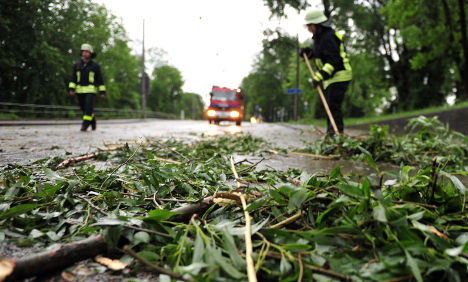The Franconia and Upper Palatinate (Oberpfalz) regions were particularly affected by the storm, with damages including flooded cellars and roads blocked by uprooted trees.
A fire in the Upper Palatinate town in Nittenau reportedly started by lightning and inflicted costly damages amounting to an estimated €250 000. Fire fighters in the region were on duty throughout the night to put out the blaze and clear felled tree branches that damaged vehicles and blocked roads in the area. Road construction works were also blown over by high winds.
River traffic in Upper Franconia was also severely affected by the storms. Authorities introduced a temporary suspension to boat travel after several embankments collapsed on the Rhine-Main-Danube canal in the district of Forchheim.
Meanwhile a 12-metre-long embankment parallel to the canal was also washed away, resulting in further disruption to water transport.
Though no-one was injured in Bavaria, a 46-year-old man in the neighbouring state of Baden-Württemberg was struck by lighting as he was opening an umbrella. But he survived with just light burns, according to the police.
Meanwhile more rain is expected to concentrate in the region for the next few days, the German Weather Service (DWD) said on Wednesday.
Heavy rain from the Lower Rhine to Baltic Sea coast and south of the Danube River will set in for most of Wednesday, with high temperatures between eight and 20 degrees Celsius across the country.
Overnight more rain is expected in the south, with heavy storms concentrated near the Alps. Temperatures could get low enough for ground frost to form, the DWD said.
The south will continue to see rain on Thursday, with scattered thunderstorms in the Alps. The rest of the country will have thick cloud cover and scattered showers with highs between a cool 7 and 14 degrees.
The soggy weather will likely continue in central and southern regions overnight, and low temperatures will bring ground frost and drop the snowfall line to about 1,500 metres.
Friday’s weather won’t improve much for the south, where more rain is expected, but western and northern regions will be mostly dry with a slight increase of temperatures ranging between 8 and 15 degrees, the DWD predicted.




 Please whitelist us to continue reading.
Please whitelist us to continue reading.
Member comments